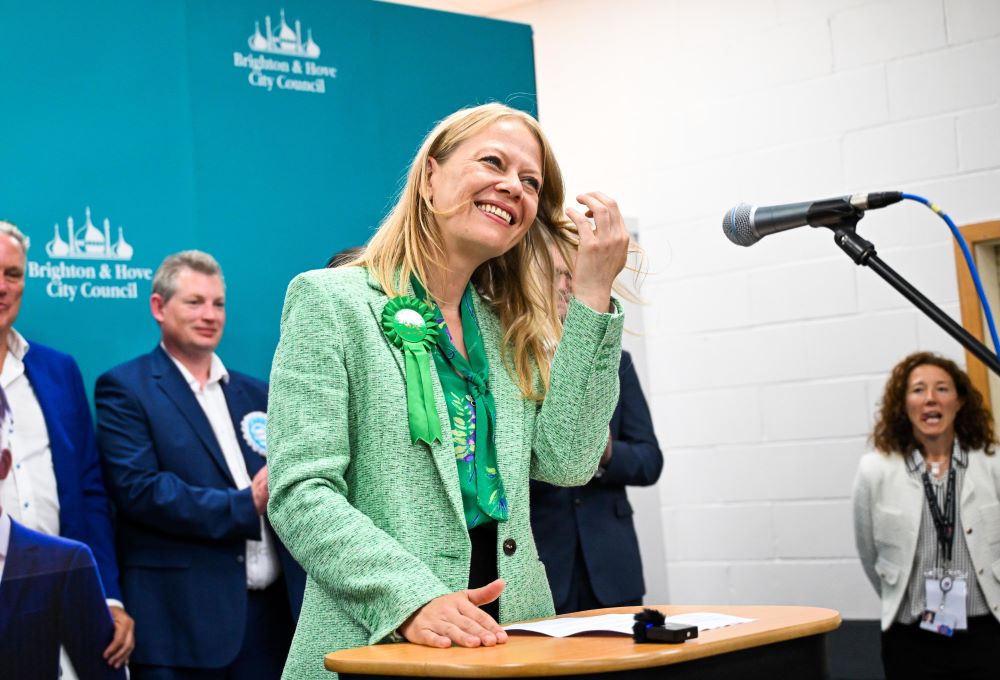Green Party Members Rejected Proposal To Join With Women’s Equality Party
4 min read
Green Party members declined a partnership with the Women’s Equality Party (WEP) just before the party shut down its operations, PoliticsHome can reveal.
In October, the WEP – a political group championing the rights of women – announced it had come to “the reluctant conclusion” that the party had “run its course”. Writing in The Guardian, founders Sandi Toksvig and Catherine Mayer said the group would support a motion proposing the group’s closure at its November conference.
The WEP had previously endorsed Green Party MP Siân Berry for Brighton Pavilion in the run-up to the 4 July General Election, with Berry going on to win a 14,290 majority. While political parties endorsing each other is not the norm, the Electoral Commission permitted the arrangement as the parties shared similar policies.
Following the WEP’s endorsement of Berry, Chair of the Green Party Executive Jon Nott shared a message on the Green Party’s conference agenda forum saying that, “the party executive will be discussing proposals for closer co-operation between our two parties”.
In September, a month before the WEP announced closure, members of the Green Party Executive Committee (GPEx) proposed collaborating with the Women’s Equality Party in a formal capacity. The proposal was entered into a ‘prioritisation ballot’, which helps decide the order in which submitted motions are debated at the party's conference based on the support they receive.
One Green Party member said there had “clearly already been work done” on the relationship between the parties and that GPEx thought the proposal would “glide through” with members. They said former and current Green MPs Caroline Lucas and Berry had also “endorsed” the proposal.
 Green MP Sian Berry was endorsed by the WEP ahead of the July General Election (Alamy)
Green MP Sian Berry was endorsed by the WEP ahead of the July General Election (Alamy)
However, the proposal was “not brought to conference to vote on”, as it did not receive enough support from members in the prioritisation ballot. The collaboration was subsequently abandoned, though a meeting with the WEP at the conference in early September still went ahead.
Another Green Party member who saw Nott’s initial message said she responded by reading the WEP website to find there was “zilch” on environmental policies. “They don't have to have policies on everything, but you would think if the Green Party was going to join up with some feminists from another organisation we'd actually want the environment to be there," they told PoliticsHome.
WEP President Mayer confirmed that the WEP leadership teams did “a lot of detailed work on paths to find a new change mechanism”, with one idea being “closer cooperation with the Green Party”.
Mayer said that at the party’s founding, they had “deliberately swerved adopting a core objective on the environment even though the causes and impacts of climate change are gendered”. The party did this “with a view to working with the Greens as well as challenging them, which more broadly was our approach to all political parties apart from populists”.
She added the party has “done a lot of constructive work with the Greens, even getting close to a joint candidacy” and so “it made sense to look at whether a more formal arrangement could galvanise politics, especially within the context of first past the post system and a Labour Party moving towards austerity.”
“If these discussions had proceeded, they would have been put to the wider membership,” she told PoliticsHome.
While the issue of trans rights has proved difficult for the WEP to navigate, the party successfully voted through a motion supporting gender self-identification in 2022. However, members of the party threatened to leave in protest at the result.
In the view of one member recently suspended from the Green Party for expressing gender critical views, joining the two parties constituted a move to “make the party look pro-women in response to recent negative publicity, leverage [WEP founder Sandi] Toksvig’s celebrity or get more trans activists in the party”. Toksvig is a comedian who has presented popular TV shows QI and The Great British Bake Off.
The other member agrees that the alliance with the WEP seemed a way for the Green Party to prove it was acting on behalf of women. They claim women are generally “invisible” within the Greens: “If you look through their manifesto, we were only mentioned as ‘women and girls’ in the short manifesto version that went out online.”
The Green Party did not respond to a request for comment.
